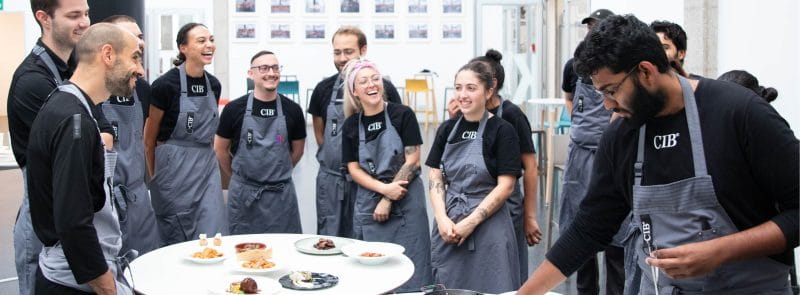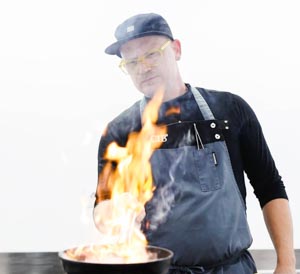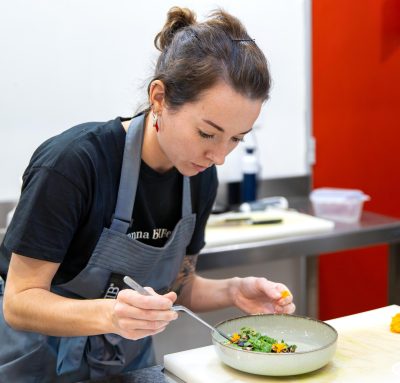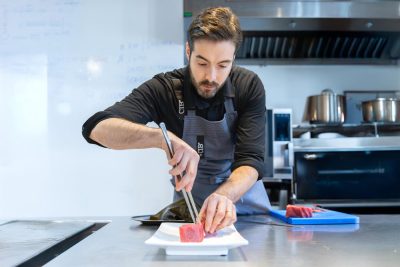Becoming a head chef is often a challenging journey, but the rewards can be deeply fulfilling. In a world where gastronomy has reached unprecedented levels of prestige, the role of the fine dining chef—also known as a head chef or international chef—has evolved significantly.
In this article, we will explore the head chef salary and how training influences both their job opportunities and salary potential. We will provide clear, direct insights and real-world data about different career paths in the culinary world, with a focus on the role of the head chef.
Salaries according to kitchen roles
Salaries in a professional kitchen vary greatly depending on the position within the brigade. Below is an estimated breakdown of average annual salaries based on role and region:
| Position | Europe (EUR/year) | North America (USD/year) | South America (USD/year) | Details |
| Head chef / Executive Chef* | 36 – 120K | 61 – 100K | 12 – 30K | Varies depending on the restaurant’s prestige and location. |
| Sous Chef (Second) | 30 – 66K | 48 – 72K | 10 – 22K | High responsability, second-in-command. |
| Chef de Partie | 24 – 42K | 42 – 60K | 8 – 18K | Depends on specialization. |
| Commis Chef (Entry-level) | 18 – 30K | 36 – 48K | 6 – 12K | Starting salary, increases with experience. |
| Pastry Chef | 24 – 60K | 45 – 72K | 8.5 – 20K | High valued in luxury hotels. |
| Private Chef | 48 – 144K | 75 – 240K | 18 – 36K | Varies widely depending on the client. |
| Kitchen Assistant | 14.4 – 24K | 30 – 42K | 4.8 – 9.6K | Entry-level wage. |
| Steward (cleaning) | 12 – 21.6K | 24 – 36K | 4.2 – 8.4K | Lower wage, but an essential position. |
* Learn the differences between an Executive Chef and a Head Chef.
A head chef’s salary depends on several factors:
- Geographic location: Countries with strong culinary traditions and thriving economies tend to offer higher salaries. However, the cost of living in these regions is typically higher too.
- Responsibilities: Depending on the establishment, the head chef’s duties may include leadership, team management, co-creation of menus, and more.
- Type of venue: Working in Michelin-starred restaurants or luxury hotels usually brings higher pay.
- Experience: A seasoned career in high-end kitchens significantly impacts salary.
- Networking and reputation: A well-known chef in the industry has more access to top roles.
- Training and certifications: Studying at top culinary schools can open doors to better-paid positions.
How does having a Michelin Star influence a chef’s salary?
A chef’s salary is closely linked to experience and the prestige of the venue. Generally, chefs working in acclaimed restaurants earn between €3,000 and €10,000 per month. However, those who earn a Michelin star can see their income rise substantially.
Chefs at Michelin-starred restaurants typically earn between €5,000 and €20,000 per month, depending on the establishment’s reputation, location, and market demand. Some chefs with multiple Michelin stars, especially in cities like Barcelona, Paris, London, or New York, may exceed these figures through brand partnerships and sponsorships.
Additionally, Michelin-starred chefs often have more opportunities to launch personal ventures, release product lines, publish cookbooks, or appear on television—expanding both their income streams and industry influence.
Countries and cities with highest salaries for head chefs
While salaries vary widely by region, some countries offer more attractive economic opportunities for head chefs. Current gastronomic trends favor creativity and innovation, alongside top-quality ingredients and techniques. Successful chefs often position themselves in cities that are vibrant, modern, and forward-thinking.
Here is an estimate of average salaries in selected countries:
| Country | Average Salary | Estimated range (annually) | Key cities |
| Switzerland | CHF 73K | 54 – 96K CHF | Geneva, Zürich, Bern , Sursee |
| Luxembourg | EUR 48K | 39 – 75K EUR | Luxembourg City, Esch-sur-Alzette, Differdange, Diekirch |
| Canada | CAD 55K | 37 – 111K CAD | Toronto and Vancouver |
| EE.UU | USD 53K | 39 – 80K USD | Atlanta, Philadelphia, Chicago, Boston |
| Australia | AUD 69K | 60 – 85K AUD | Perth, Melbourne, Sydney, Brisbane |
| Norway | NOK 582K | 425 – 713K NOK | Bergen, Oslo, Bodo, Trondheim |
| United Kingdom | GBP 54K | 45 – 90K GBP | London, Manchester |
| France | EUR 40K | 30 – 80K EUR | Fine dining in Paris |
| Germany | EUR 31K | 27 – 47K EUR | Berlin, Hamburg, Munich, Cologne |
| Denmark | DKK 436K | 318 – 534K DKK | Copenhague, Aarthus, Odense, Aalborg |
* These figures are approximate and may vary depending on a chef’s experience, type of establishment, and specific location. Other factors such as cost of living and local tax policies can also affect net income.
Countries like Spain, Iceland, Ireland, the UAE, Canada, and Finland have seen rapid culinary growth driven by tourism. The luxury hospitality sector also continues to generate numerous roles for highly trained chefs.
Entrepreneurial spirit and business opportunities
For many chefs, the ultimate goal is not just to hold a top position at a prestigious restaurant, but to open their own culinary venture. Launching a fine dining concept can be a profitable investment, depending on the country where it is established.
Some countries offer favorable ecosystems for culinary entrepreneurs thanks to government support, access to funding, or established food cultures. Here are a few of the top destinations to open a restaurant:
- Spain: Ranked third globally by TasteAtlas, Spain is a gastronomic powerhouse. Cities like Madrid and Barcelona lead in culinary innovation, blending tradition with modern Mediterranean cuisine. Spain is a top destination for food tourism, making it a strong choice for launching or advancing a culinary career.
- United States: With a highly diverse culinary scene, the U.S. offers ample opportunities—especially in New York, Los Angeles, and San Francisco. Access to investors and incubators makes it easier to start a business. Emerging hubs include Portland (Maine), Chicago, and Austin (Texas).
- France: With its rich culinary heritage, France provides a solid market for innovative restaurants, particularly in Paris and Lyon. However, competition is intense and regulations strict.
- Tokyo, Japan: Combines ancient culinary tradition with innovation, making it a pioneer city for culinary entrepreneurship.
- United Arab Emirates: Dubai and Abu Dhabi have rapidly grown into luxury food destinations, with clientele willing to pay for premium dining experiences.
- Singapore: A financial and gastronomic hub, ideal for launching high-end restaurants with broad appeal.
- Australia: Sydney and Melbourne have dynamic food scenes and offer support for new culinary businesses.
- Canada: With multicultural clientele and government incentives for startups, Canada is an appealing destination for chefs looking to innovate.
While entrepreneurship carries risks, solid planning and formal training in restaurant management can significantly boost a venture’s chances of success. Previous experience in fine dining and a distinctive culinary concept are key to strong performance.
The impact of training on a Head Chef’s salary
For many years, the culinary profession was undervalued and seen as a less promising career path compared to law or engineering. That perception has changed dramatically. Today, more young people are choosing the training in culinary arts as their first option, while others are making career shifts to enter the world of gastronomy—whether by joining top restaurants or launching their own ventures.
Culinary arts now represent a thriving sector with strong, well-paid career paths for those who receive high-quality training. The role of the international chef is globally recognized and respected. Studying at international culinary schools with multicultural environments not only helps build professional networks, but also fosters a deeper understanding of global gastronomy.
Chefs who specialize through advanced training programs gain access to more competitive job markets and higher salaries. These programs go beyond technical cooking skills to include key areas such as entrepreneurship, team management, creativity, innovation, and leadership. In a constantly evolving industry, these transversal skills are essential for professional growth and for assuming higher-responsibility roles.
The ability to innovate and manage teams effectively has become a defining trait in the culinary world. Chefs with comprehensive, well-rounded holistic training are better equipped to navigate industry challenges, adapt to emerging trends, and command higher salaries.












